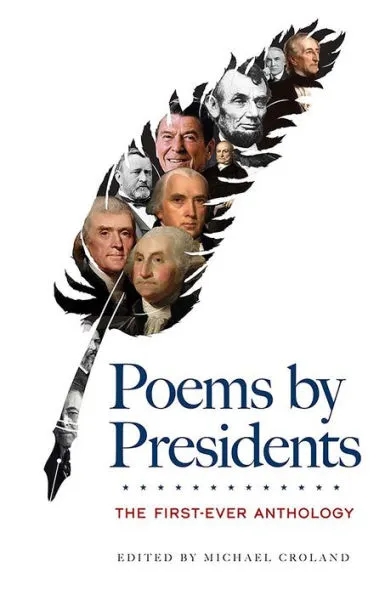A Book Review
Roses are red,
Violets are blue,
POTUSES, Politics.
Poetry too?
What a surprise! Editor Michael Croland has amassed a charming little array of actual poetry (ok, plus a few limericks and light verse) written by some of our Presidents.
There are a few Chief Executives with some talents and skills in the fine arts. Harry Truman and Bill Clinton had a few occasions to show off their musical flair. Both Ike and George W. Bush found hitherto unknown gifts with paint and brush. Even big guys, like George Washington, William H. Taft and Lyndon Johnson could whirl partners on the dance floor with some agility.
Of course most Presidents had considerable experience with the written word long before the Presidency was on their horizon. It is also important to note that in long-past times, the language of the written word was considered near-separate from the language people used in personal speech. Written classical language (with mandatory thee and thou) was what was taught in school, rather than picked-up in childhood.
A few of our Presidents were especially gifted with graceful prose. Thomas Jefferson… “We hold these truths….”. Abraham Lincoln… “With malice toward none… Franklin D. Roosevelt… “A rendezvous with destiny…”
Many of our Presidents were prolific in their writing. Theodore Roosevelt penned about 30 separate volumes, and a gazillion magazine articles, etc. Woodrow Wilson also was a prolific writer, churning out a book a year during his academic career – mostly to augment his meager salary.
Modern Presidents are expected to write their memoirs (or at least collaborate in their writing). Most of them make a lot of money with it. Some, like Jimmy Carter, has a pen that won’t quit!
And, as one would expect, some are better writers than others.
But poetry?
Croland’s well researched slim volume of POTUS versifying is a wonderful treat for Presidential aficionados who also appreciate poetry. And, again, as one would expect, some POTUSes were better than others.
One surprise, is a tidbit about Thomas Jefferson. Most biographies include an 83-year-old TJ on his death bed, sighing to his daughter Martha, “the last pang in life is in parting from you.” A poignant phrase. But it was actually part of a brief verse he wrote…
Then farewell, my dear, my lov’d daughter, adieu!
The last pang of life is in parting from you!
Jefferson’s pal Madison, a brilliant mind, but pedantic wordsmith, has a couple of entries in the anthology, but they are “youthful” attempts from his student days – and his endless couplets pale in comparison to Jefferson’s eight lines.
The poet-est of them all, is the unlikely John Quincy Adams, whose acerbic nature does not spring to mind as a fellow of gentle feeling. But… JQ famously confided to his diary, “I have been a lawyer for bread, and a Statesman at the call of my Country…” but in truth, if he’d had his “druthers,” he would “druther” have been a poet. And he was pretty good at it, albeit he seldom varied from his rhythm and form. They all tended to sound like they could have been set to hymns. He was a religious fellow by nature, and thee’d and thy’d a lot. (Most of the old POTUSes did that. It was part of the classical “school” format.) And perhaps the depth of JQ’s intellect had a secret partnership with his heart.
One of JQ’s poems stands out – and in fact, according to Croland, Ralph Waldo Emerson was impressed enough to include it in an anthology. Titled The Wants of Man, it is a 19th century version of “If I Were A Rich Man”: A litany of very secular pleasures. To wit. And to smile.
What first I want is daily bread,
And canvas backs and wine;
And all the realms of nature spread
Before me when I dine.
Four courses scarcely can provide
My appetite to quell,
With four choice cooks from France, beside,
To dress my dinner well.
And the man can punctuate poetry too!!
Abraham Lincoln was also known to stroll the “triplingly on the tongue” path, waxing poetic about a couple of long-past memories or thoughts that evoked deep personal feelings. Maybe deep feelings, but it didn’t evoke Lincoln. He was in his milieu in the John Greenleaf Whittier fashion. It suits him perfectly. His The Bear Hunt is a delightful story-poem, including a little humorous twist at the end.
Then of course, there is a little versie about Gettysburg… visual, too!
In eighteen sixty three, with pomp,
and mighty swell,
Me and Jeff’s Confederacy, went
forth to sack Phil.del.
The Yankees they got arter us, and
gin us partic’lar h_ll,
And we skedaddled back again,
and didn’t sack Phil.del.
Ah. Warren G. Harding. A newspaperman. A wordsmith by profession. And a lover by inclination! He was a hopeless romantic – and rather prurient and sly with his double entendres in verses written to his long-time inamorata Carrie Phillips. A trove of love letters he wrote to her (rhyming or not) were published more than 75 years after his death, after decades of legal hassling by Harding descendants trying to tidy up WGH’s private life. Maybe not etched for eternity, but definitely worth the read!
Editor Croland graciously and generously acknowledges poetry-lovers among our Presidents. After all, poets need appreciators, too. Perhaps the most important of the “lovers,” was Theodore Roosevelt, a great appreciator of all sorts of talent. He was “introduced” to the the poetry of a young-and-starving Edwin Arlington Robinson by his teenaged son Kermit. POTUS TR liked and appreciated the poetry, and arranged a federal clerical position for Robinson. Not demanding. Pay-the-rent. Write the poems.
Poems by Presidents is a wonderful book for every POTUS-lover’s shelf. Buy it. You’ll have an enjoyable read!
Michael Croland
ISBN: 978-0-486-85153-2
$14.95

